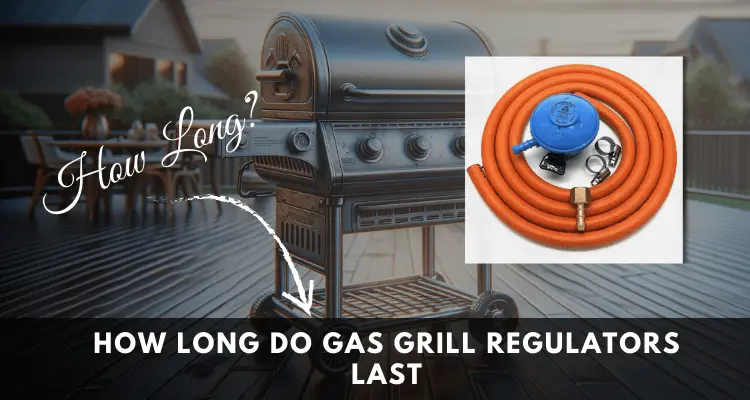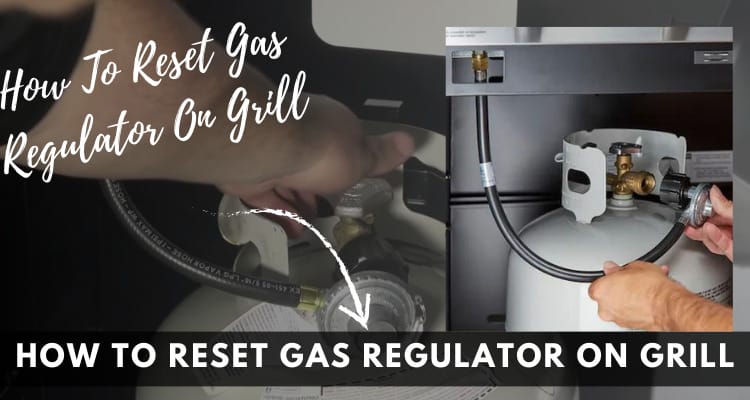How Long Do Gas Grill Regulators Last
Do you want to know the secret to extending the lifespan of your gas grill regulator?
Gas grill regulators can last up to 5 years with proper maintenance and usage. Regularly inspecting for wear and tear, cleaning the regulator, and replacing it when necessary can extend its lifespan. Maintain your grill’s performance by replacing the regulator every few years.
In my experience, gas grill regulators last anywhere from 3-5 years with regular use and proper maintenance. However, factors like weather conditions and frequency of use can affect their lifespan. It’s always a good idea to keep an eye on the regulator and replace it when necessary for optimal grilling performance.
In this article, we will discuss the factors that can affect the lifespan of your gas grill regulator and share tips on how you can extend its longevity.
Factors Affecting Gas Grill Regulator Lifespan
There are several factors that can affect the lifespan of your gas grill regulator. It’s important to keep these in mind to ensure that you get the most out of your regulator and maintain your grill’s performance.
1. Frequency of Use
The more often you use your gas grill, the faster its components can wear out, including the regulator.
If you’re an avid griller and use your grill multiple times a week, then you may need to replace the regulator every few years.
On the other hand, if you only use your grill occasionally, the regulator may last longer.
2. Weather Conditions
Extreme weather conditions like high heat, intense sunlight, and heavy rain can also affect the lifespan of your gas grill regulator.
Exposure to these elements can cause wear and tear on the regulator’s components, leading to a shorter lifespan.
If you live in an area with extreme weather conditions, it’s important to regularly inspect and maintain your regulator.
3. Maintenance
Regularly cleaning and maintaining your gas grill can also have a significant impact on the lifespan of its components, including the regulator.
Make sure to follow the manufacturer’s instructions for cleaning and maintenance, as well as regularly inspecting for any signs of wear and tear.
4. Quality of Regulator
The quality and brand of the regulator you purchase can also affect its lifespan.
It’s important to invest in a high-quality regulator from a reputable brand to ensure that it will last longer and provide better performance.
5. Signs That Your Regulator Needs to Be Replaced
There are a few signs that indicate it may be time to replace your gas grill regulator. These include:
- Difficulty in lighting the grill or keeping it lit
- Uneven flames or inconsistent heat output
- Hissing noises coming from the regulator
If you notice any of these signs, it’s important to replace your regulator as soon as possible to avoid any potential safety hazards or damage to your grill.
Key points to remember
- Gas grill regulators can last up to 5 years with proper maintenance and usage.
- Factors like frequency of use, weather conditions, and maintenance can affect the lifespan of your regulator.
- Signs that indicate it may be time to replace your regulator include difficulty lighting the grill, uneven flames, and hissing noises.
By keeping these factors in mind and regularly maintaining your gas grill and its components, you can extend the lifespan of your regulator and ensure optimal grilling performance for years to come.
Gas Grill Regulators Temperature Settings
When it comes to using your gas grill, one of the most important things to understand is how to adjust and control the temperature.
This not only ensures that your food cooks evenly, but also helps in prolonging the lifespan of your gas grill regulator.
Here are some key tips for effectively using your gas grill regulators’ temperature settings:
- Start by preheating your grill for at least 10-15 minutes before cooking to allow the regulator and burners to reach the desired temperature.
- Adjust the temperature by turning the knobs on your grill’s control panel. Keep in mind that not all grills have precise temperature gauges, so it may take some practice to get to know your grill’s specific settings.
- Use a thermometer to accurately check the temperature inside your grill, especially for recipes that require specific cooking temperatures.
- Maintain a consistent temperature while cooking by regularly adjusting the regulator as needed.
By following these tips, you can not only ensure delicious and evenly cooked food but also extend the lifespan of your gas grill regulator.
Signs of a Failing Gas Grill Regulator
While regular maintenance and replacement can help extend the lifespan of a gas grill regulator, it’s important to recognize when it may be time for a new one.
Here are some signs that your regulator may be failing:
1: Inconsistent Flame
If you notice that the flame on your grill is inconsistent or keeps going out, it may be due to a failing regulator. This can also cause uneven cooking and temperature fluctuations.
2: Difficulty Lighting or Keeping Grill Lit
A faulty regulator can make it difficult to light your grill or keep it lit. If you find yourself struggling to get your grill started or constantly relighting it, it may be time to check the regulator.
3: Hissing Noises
A hissing noise coming from the regulator is a clear indication that something is wrong and needs to be checked. This could be a sign of a gas leak, which can be dangerous if not addressed immediately.
If you experience any of these signs, it’s important to replace your gas grill regulator as soon as possible for safety reasons and to maintain optimal grilling performance.
Maintenance Tips for Gas Grill Regulators
To ensure the longevity of your gas grill regulator, it’s important to regularly clean and maintain it.
Here are some key maintenance tips to keep in mind:
1: Clean the Regulator
Use a mixture of warm water and dish soap to clean the exterior of your regulator. Be sure to also remove any dirt or debris from the vents using a soft brush.
2: Inspect for Damage
Regularly inspect your regulator for any signs of damage, such as cracks or rust. If you notice any issues, it’s important to replace the regulator immediately.
3: Check for Gas Leaks
Use a mixture of soapy water to check for any gas leaks. Apply the solution to the connections and if you see bubbles forming, it indicates a leak that needs to be addressed.
4: Store Properly
When not in use, store your gas grill in a covered area to protect it from the elements. This can help prevent wear and tear on the regulator and other components.
By following these maintenance tips, you can keep your gas grill regulator in good condition and ensure safe and efficient grilling for years to come.
Common Issues Impacting Gas Grill Regulator Longevity
While proper maintenance and usage can help extend the lifespan of your gas grill regulator, there are some common issues that can impact its durability.
Some of these include:
- Exposure to extreme weather conditions like high heat or cold temperatures
- Poor quality or faulty regulators with manufacturing defects
- Overuse or misuse of the regulator, such as leaving it on for extended periods of time
To prevent these issues from affecting the lifespan of your regulator, it’s important to invest in a high-quality regulator from a reputable brand and follow proper maintenance and usage guidelines.
Expert Tips to Extend Gas Grill Regulator Lifespan
For even more useful tips on how to extend the lifespan of your gas grill regulator, we spoke with an expert from a leading grilling company.
According to the expert, here are some key factors that can impact the longevity of your regulator:
Expert Tip 1: Proper Storage
Storing your gas grill and its components properly can significantly impact their lifespan. The expert recommends covering your grill when not in use to protect it from the elements.
Expert Tip 2: Regular Maintenance
Regularly cleaning and inspecting your regulator for any issues is crucial to ensure its longevity. The expert suggests cleaning the exterior of the regulator with warm water and dish soap and checking for any signs of damage or gas leaks.
Expert Tip 3: Avoid Overuse
While it may be tempting to leave your grill on for extended periods of time, this can actually cause unnecessary wear and tear on the regulator. The expert recommends turning off your grill when not in use to prolong the lifespan of the regulator.
Expert Tip 4: Invest in Quality
Investing in a high-quality gas grill regulator from a reputable brand may cost more upfront, but it can save you money and hassle in the long run.
The expert advises researching different brands and their warranties to find the best option for your needs.
Quality vs Lifespan: Choosing the Right Gas Grill Regulator
When it comes to choosing a gas grill regulator, the quality of the product is just as important as its expected lifespan.
It’s important to find a balance between cost and durability, as investing in a cheaper but lower quality regulator may end up costing you more in the long run due to frequent replacements.
Consider factors such as brand reputation, customer reviews, and warranty options when making your decision. It may also be beneficial to consult with experts or experienced grillers for their recommendations.
With proper maintenance and usage, a high-quality gas grill regulator can last for many years, providing you with deliciously grilled meals for countless cookouts. So remember to regularly clean and inspect your regulator, store it properly, and invest in quality to ensure the best possible grilling experience.
Conclusion
In conclusion eye out for warning signs such as inconsistent flame, difficulty lighting or keeping the grill lit, and hissing noises.
Regular maintenance and storage, along with avoiding overuse, can help extend the lifespan of your regulator. It’s also crucial to invest in a high-quality, a failing regulator can significantly impact the performance and safety of your gas grill.
It’s important to keep an eye out for any issues and address them immediately to ensure safe and efficient grilling for years to come.
So don’t forget to give your gas grill regulator some love and attention, as it plays a crucial role in your overall grilling experience.

